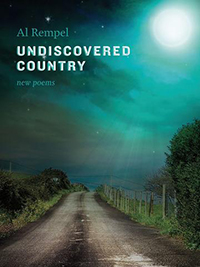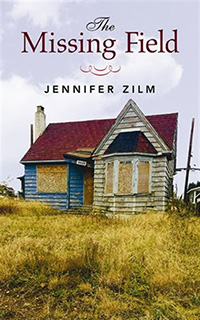Reviews
Poetry Reviews by Rose Morris
Al Rempel, Undiscovered Country (Salt Spring Island: Mother Tongue, 2018). Paperbound, 80 pp., $19.95.
Jennifer Zilm, The Missing Field (Oakville: Guernica, 2018). Paperbound, 79 pp., $20.
 Al Rempel’s latest collection, Undiscovered Country, dabbles in both the long and short poem forms. While many books that include long poems interspersed with short ones can feel disjointed and clunky, Rempel manages to seamlessly connect his pieces through the unifying theme of grief. Rempel’s poems search for that unknown future of what happens to us after we die by looking back. In “All I Have to Do is Go to Work and Come Home,” we see a speaker, whose life is changed by loss, striving to move forward by regaining a past routine, telling himself to “put your hand on the doorknob and turn; / you’ve been here before.” Nostalgia and reflections of the past become just as important as musing on what lies ahead, and looking back is used as a means of making sense—or at least attempting to make sense—of death, grief, and moving on.
Al Rempel’s latest collection, Undiscovered Country, dabbles in both the long and short poem forms. While many books that include long poems interspersed with short ones can feel disjointed and clunky, Rempel manages to seamlessly connect his pieces through the unifying theme of grief. Rempel’s poems search for that unknown future of what happens to us after we die by looking back. In “All I Have to Do is Go to Work and Come Home,” we see a speaker, whose life is changed by loss, striving to move forward by regaining a past routine, telling himself to “put your hand on the doorknob and turn; / you’ve been here before.” Nostalgia and reflections of the past become just as important as musing on what lies ahead, and looking back is used as a means of making sense—or at least attempting to make sense—of death, grief, and moving on.
This latching on to the familiar is also seen in the literary references made throughout the collection. While Rempel is busy chasing that undiscovered country of the afterlife, the poems are set in a familiar, rural northern landscape of so much classic Canadian literature. Well-known figures of the CanLit world weave their way through the poems, with a quote from Al Purdy prefacing the section titled “Road by the River,” short poems dedicated to Patrick Friesen (“Homing Beacon”) and John Lent (“Coyote Coloured”), and Leonard Cohen showing up in a coffee house “singing about angels and redemption.” It seems that, as the speaker uses the past and nostalgia of a life to make sense of a death, Rempel is using past Canadian poets to carve his own place in the CanLit canon.
While one might expect a poetry collection about grief to err on the side of the dismal, Rempel manages to inject a great deal of humour and playfulness into the collection. “Sitting at the Kitchen Nook,” for example, gives us an amusing take on mortality, where life, upon the passage of time, is referred to as “an almost empty cereal bowl.” This kind of tongue-in-cheek wit both pokes a little fun at the weighty theme of the collection and at the typical image of the poet as a humourless figure whose pretentious metaphors, in the end, could just as easily be written about processed breakfast foods.
Overall, this collection is deftly written and delightful to read. There is an easy flow as well as enough complexity that one is likely to go back and reread to find meaning and musings missed the first time around.
 Jennifer Zilm’s The Missing Field is essentially a celebration of documentation. It is separated into two parts (well, three if we are to believe the table of contents, which lists part ii as “The missing field,” although it does not actually appear in the body of the book) titled “ephemera” and “In the archives.” The first focuses on the documents of everyday life—postcards, a used copy of Rilke, an old newspaper—while the second centres around documents used and studied by academics—the Bible, lecture notes, archival photographs. Throughout the exploration of different types of documentation and archives, the author investigates how we document and archive ourselves, where we leave our marks and how we mark ourselves. This can be seen most clearly in “Uncollected Translations,” where the speaker states, “on my cheek, the yellow sun / has dropped her thin red freckles.” Here, the human body is a blank page marked by the world around it.
Jennifer Zilm’s The Missing Field is essentially a celebration of documentation. It is separated into two parts (well, three if we are to believe the table of contents, which lists part ii as “The missing field,” although it does not actually appear in the body of the book) titled “ephemera” and “In the archives.” The first focuses on the documents of everyday life—postcards, a used copy of Rilke, an old newspaper—while the second centres around documents used and studied by academics—the Bible, lecture notes, archival photographs. Throughout the exploration of different types of documentation and archives, the author investigates how we document and archive ourselves, where we leave our marks and how we mark ourselves. This can be seen most clearly in “Uncollected Translations,” where the speaker states, “on my cheek, the yellow sun / has dropped her thin red freckles.” Here, the human body is a blank page marked by the world around it.
Reading the poems in order, you begin to realize that information given earlier in the book is actually a tool to help you read and understand the poems that follow. My personal favourite poem in the book, “Reading Rilke in the Bath, Revisited,” tells us the “fun fact” that the German language “capitalizes every Noun as though / to underscore that it is THINGS that matter.” Later in the book, we come across instances where Zilm uses this German style of capitalization (as in “Our Lady of Sorrows: Vancouver East”) and now know what it signifies and what the author intends—to place importance on material things, which is exactly what a poetry collection about material documents should do. Another point where a poem informs the ability to read a later poem in the book occurs in “Cataloguing Notebook, October: of night I made a commonplace,” where we learn what a commonplace book is. In the following poem, “Archive of a Girl,” we see social media used as a modern commonplace book where the speaker “pastes” the documents of her life.
The majority of poems in this collection are deliciously complex and pleasurable to read, but there are a few that fall flat in comparison. Those that focus mainly on place (“Our Lady of Sorrows: Vancouver East,” “Bicycle on Qing Dong Road”) don’t do much for the book as a whole. They are perfectly fine poems with interesting imagery, but not a lot of feeling or conflict arises in these pieces, while the poems centred on the intellectual landscapes of documents and ephemera—the material places where our thoughts live—are endlessly intricate and beautiful.
—Rose Morris









